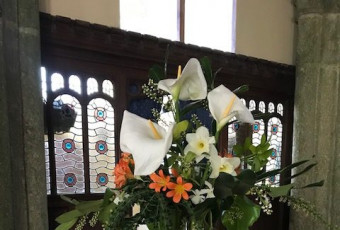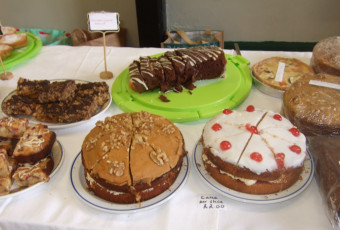Peter & Paul 29 June 2014 Mission Community Service – Meavy
ISIS is not a group I had heard of until a few weeks ago and now the news is full of this group of Sunni Muslims who are attacking Iraq and overpowering their Shia brothers with whom they have no truck. We have heard of radicalised British Citizens who have gone to Syria and Iraq to join the Jihad, not against ‘the infidel’ this time, but against their own religion. I cannot help thinking that it is similar to the religious wars of a few centuries ago in Europe with the Catholics and Protestants at each others’ throats, both sure that they had cornered the market in the truth, and both prepared to die for what they believed to be right.
And then I read our lectionary of the zeal of both Peter and Paul: of imprisonments, of beatings, of an assurance that they are right and wonder how easy they would have been to live with? Undoubtedly, in one sense, they were the extremists of their day – but theirs was the path of non-violence rather than taking up the sword. Indeed, putting these two saints together on a single Saints’ Day is rather interesting seeing that they hardly saw eye to eye during their lifetimes. There was a huge falling out between them over the observance of Jewish traditions and practices and whether all Christians were required to do so. The rough and ready, impetuous fisherman was probably no intellectual match for the well educated Paul. And we know from Peter’s second letter (2 Peter 3.16) that even he found Paul difficult to understand saying about Paul’s writings “they contain some obscure passages which the ignorant and unstable misinterpret to their own ruin.”
Yet notwithstanding their obvious differences, they had a fervent conviction that they had a message that was life-changing and life-affirming – and they wanted to share this fantastic news with everyone they met. It landed them in a great deal of trouble.
And of course, that got me thinking again: How can we be radical disciples of Jesus Christ in the times in which we live whilst still wishing to espouse the values of living in a liberal democracy so far as they reflect the values of the kingdom of God? This is a real challenge of us.
How can we be those who live lives honouring to God and with that zeal to want to engage others in the truth of Jesus Christ.
First, like those Disciples of Christ, we have to work out who we think Jesus is. The question Jesus asked his disciples “Who do you say that I am?” is one that we should ask ourselves. Who do we say Jesus is? In answering that question we will be able to work out our priorities in life because if we believe that Jesus is the Messiah, the Son of the living God, then surely consequences flow from that belief?
It may seem obvious but if we profess a faith that Jesus is the Son of God then we need to take that seriously and prioritise our lives around that keystone belief.
Secondly, I think we need to take the long view. In saying this I realise it was John Maynard Keynes the eminent economist who said ‘in the long run we are all dead’ but we need to try to view things in the light of eternity. I wonder for myself if like St Paul at the end of my life I will be able to say that I have run a good race and fought the good fight? That is a question that will be put to me by God who will judge me. Thankfully I will have the best advocate there is on hand to make my case – Jesus himself – what an encouraging thought that is! Whatever my shortcomings may be, of which there are one or two, Jesus stands before God pleading on my behalf. He does the same for each of us as we name him as our Lord and Saviour.
Thirdly, and in contrast to the current warmongering we find in the Middle East, God’s battles are won not by might, nor by power, but by his Spirit. The values of the kingdom of God seem to be at odds with the way of the world but looking back to Peter and Paul, both of whom gave their lives because they were followers of Jesus Christ, we would be fools to ignore their example and their testimony.
Where does that leave us? I think we still have to be cautious and avoid sound bite solutions. If there were easy answers we would be doing them already. I am also always weary of any argument that runs ‘they did it that way in the New Testament so we must do it that way now’. It is not that simple. We have the principles of our faith but the Bible is not some sort of systematic encyclopaedia where we can find proof answers set out for us. To love God and our neighbour as ourselves are the two great commandments but our ethical behaviour has to be nuanced and we have to grapple with each new situation we come across.
For example, how do we respond to the rise of militant Islam? For centuries our country has been at the forefront of human rights, which flow out of our Christian heritage to welcome the stranger, the orphan and the widow. We cannot lose that essential part of our witness to the love of God in the face of the current crisis in the Middle East. We do need to think and pray about how we continue to be the people of God in a situation that is extremely complex to understand but which could have a profound effect on all of us. We need to hold our leaders in prayer as they make difficult decisions on our behalf. We also need to listen to what God is saying to us.
Now is not the time to promote “us and them” as a solution. It was St Paul himself who reminded the early Christians in Galatians 3.28 that in Christ there is no Jew or Gentile, slave or free, male or female, because all are one in Christ Jesus. What a challenge that continues to be for us today.
So when we meet on this festival that gives thanks for the lives of St Peter and St Paul we are acutely aware that in some senses the challenges they faced are challenges that we face today. We have to find our way to present Jesus Christ to people in our time, to share the love of God with all regardless of race, gender, colour or creed. That is no easy task in the face of the events that we see unfolding on our TV screens but we have to make a start – and that means starting with you and me. We may not be able to change the events on the world stage but we can influence our friends and neighbours, to present to them the joy of what it means to be a follower of Jesus Christ today.
God give us all the will and the purpose to take up our cross and follow him today. Amen.










